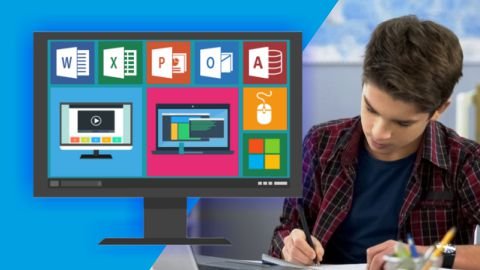In today’s world, computers have become an essential part of our daily lives. Whether it’s for personal tasks or professional work, the basic computer course plays a crucial role in equipping individuals with the skills necessary to navigate and perform everyday tasks. As the use of computers grows rapidly, understanding their applications is more important than ever.
What is a Basic Computer Course?
A basic computer course is designed to introduce individuals to the world of computers and technology. It typically covers fundamental applications such as:
- Microsoft Word
- Microsoft Excel
- Microsoft PowerPoint
- Internet Usage

This course is suitable for beginners, including those with minimal or no knowledge of computers. The focus is on teaching the foundational skills needed to operate a computer efficiently. Whether you are a student, a professional, or someone looking to improve your computer skills, this course can help you start your journey into the digital world.
By enrolling in a basic computer course, you’ll learn essential skills that can enhance your understanding of more advanced topics in computing. It’s an ideal first step for anyone looking to improve their proficiency in computer-related tasks.
Uses of Computers in Society
The impact of computers on various sectors is undeniable. From schools to businesses, computers help streamline processes and improve efficiency. Let’s take a look at how computers are used in different areas of society:
1. Big Store Malls
In large retail environments like malls, computers play a vital role in operations such as billing and inventory management. Without computers, completing tasks like billing, tracking purchases, or managing stock would take an immense amount of time. Computers make these processes much faster and more accurate, helping businesses serve customers efficiently.
2. Companies and Organizations
In businesses and organizations, computers are indispensable tools for various functions, including maintaining records, processing payrolls, and managing communications. From managing employee data to handling financial transactions, computers have revolutionized how businesses operate and stay competitive.
3. Hospitals
Hospitals use computers to manage patient records, schedule appointments, and process billing. Electronic health records (EHR) systems help medical professionals keep track of patient histories and ensure that treatment is provided in a timely manner. Without the use of computers, such critical processes would be slower and more prone to errors.
4. Schools and Colleges
In educational institutions, computers are used for storing student data, grading assignments, and even conducting online classes. Students and teachers rely on computers to access educational resources, collaborate on projects, and manage assignments. Computers have made education more accessible and efficient, improving the learning experience for everyone involved.
5. General Everyday Use
Beyond professional and academic settings, computers are used for various personal tasks such as playing games, paying bills online, and keeping track of finances. With the increasing availability of online services, computers enable individuals to manage almost every aspect of their lives with just a few clicks.
Conclusion
Understanding what is a basic computer course and its relevance is crucial in today’s digital age. Whether for work, study, or personal tasks, computers have become an integral part of society. A basic computer course serves as an excellent starting point for individuals to enhance their skills, making them more proficient in handling various tasks.
By learning the basics of computer usage, you can navigate the digital world more confidently and efficiently. It’s a skill set that benefits everyone, from students and teachers to business professionals and homemakers.
